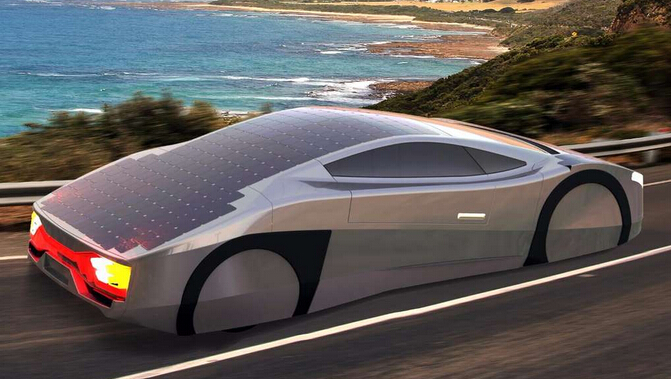The Immortus is an electric car built to generate its own power through
some 7 sq m (75 sq ft) of solar photovoltaic paneling. You can charge its battery
off the mains if you have to, but if conditions are sunny, the inbuilt solar panels alone
will let you drive at more than 60 km/h (37 mph) for an unlimited distance. The Immortus is
based on solar race car technology with the project originally founded by Australia’s
Aurora Solar Car Team, which has competed in a bunch of solar race events across the world.
The light weight and the shape of the Immortus combine maximal sun exposure with
extreme aerodynamics, including covered wheels. Unlike the solar racers, though, it’s designed to
approach practicality on the road, with a 0-100 km/h (62 mph) time that will be less than seven seconds
and a top speed over 150 km/h (93 mph). It's also a two-seater with a modest luggage capacity
for daily driving. Melbourne-based EVX Ventures, creators of the Immortus, even list fun as a priority,
saying it should handle like a well-balanced sports car.

Where the Tesla Model S has a massive 85 kWh battery pack, the self-replenishing system
on the Immortus uses only a 10 kWh lithium-ion phosphate battery. The car uses twin DC motors
mounted on the uprights leading to each rear wheel hub, each with a peak output of 20 kW,
for a total peak output of 40 kW (53.6 hp). While 40 kW doesn’t sound like much, the entire car
has been designed to make the most of its power. A feather-light weight of around
550 kg (1,212 lb) gives the Immortus a power-to-weight ratio and acceleration time similar to
a Mazda MX5 (aka Miata), and the weight distribution is designed to offer similarly
sporty handling characteristics.
The Mazda will out-corner it though, because the Immortus won’t use regular road tires.
It’ll use tires specifically designed for solar racers, very thin wheels with low-friction tires that
prioritize low rolling resistance over grip. These aren’t the most attractive wheels, but then,
they’re hidden away behind the aerodynamic wheel arch covers anyway. And thanks to
exceptionally low weight, low-drag aerodynamics and low-friction, low-contact tires, EVX expects
the car’s small 10 kWh battery pack to be good for just under 400 km (248 mi) worth
of range even at night, when there’s no solar assistance topping it up. When the sun’s out
and the road’s clear, that range goes up, effectively to infinity if you stay around 60 km/h (37 mph).
Upping the pace to 85 km/h (53 mph) the range drops to about 550 km (342 mi).
Ease of construction is key for the Immortus team, because they don’t plan to mass-produce
the car, or even to build it in-house. There is regulation in the US and Australia
that allows for individually constructed vehicles. Essentially what that means is that if you contract
a custom car builder with the designs and components, you can build a road legal car without
the crash testing and the 5-10 million dollars you’d have to raise to do that, said Barry Nguyen, CEO
and co-founder of EVX Ventures.
Thus, the Immortus has been designed to be exceptionally simple to assemble. Abandoning early
concepts that used a carbon-fiber monocoque frame with two large tubs, the most recent design features
an ultra-lightweight space frame using off-the-shelf carbon fiber tubing, with 3D-printed nodes to
connect the tubes. The frame of the car is effectively like a big Meccano set.
This simplifies the manufacturing process, as well as reducing transport costs.
The plan is to have these cars assembled by custom car builders close to wherever the customer is.
The custom shops can source their own carbon fiber tubing, and the team can either send over
the 3D-printed node parts or send over the designs so they can print them locally.
EVX doesn’t expect to sell more than 100 of the Immortus. At an estimated
AUD$500,000 (approx. US$370,000) depending on spec, it’s a boutique, high priced technology platform
that will only appeal to extremely wealthy early adopters. But the ideas developed through
the Immortus project are filtering out into a range of other projects that
are much more consumer focused. EVX is looking to raise about US$1.5 million dollars
to get the Immortus production ready, and will be taking a scaled-down, remote control version
of the Immortus to SEMA in Las Vegas later in the year.
Either way, early as it is, the Immortus, along with the Stella Lux prototype from the Netherlands,
paves the way for a new category of vehicle, one that’s all but energy independent. An electric car in which
you rarely, if ever, have to think about where the next charge point is. A high-end, high tech sportscar
you won’t want to keep in your garage, because it can’t get any sun in there. And as battery technology
and photovoltaic efficiency continue to improve, these kinds of cars could become a lot more viable.
Contact:Viya
Phone:+86.13967651636
Tel:+86.576-87209817
E-mail:sales@yuanweicn.com
Address: Science&Technology Zone,Kanmen,Yuhuan,Zhejiang,China.